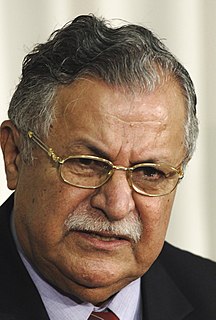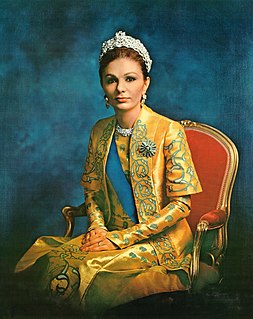A Quote by Zalmay Khalilzad
Americans have eliminated Iran's worst enemies, the Taliban in Afghanistan and Saddam [Hussein]. I occasionally threatened my Iranian counterpart in Kabul that one day I would send him a big bill for what we did. But, seriously, Iran is pursuing a dual strategy in Iraq. On the one hand, the Iranians, after decades of hostility, are now interested in good relations. On the other hand, they want to keep the country weak and dominate the region.
Quote Topics
Afghanistan
After
Big
Bill
Counterpart
Country
Day
Decades
Did
Dominate
Dual
Eliminated
Enemies
Good
Hand
Him
Hostility
Hussein
Interested
Iran
Iranian
Iranians
Iraq
Kabul
Keep
Now
Occasionally
One Day
Other
Pursuing
Region
Relations
Saddam
Send
Seriously
Strategy
Taliban
Threatened
Want
Weak
Worst
Would
Related Quotes
Iran is a powerful country. Iran is a big country with a large population, natural resources, human resources. But we are a country that is content with its size, content with its geography. We have not engaged in any military adventures in the past 250 years. We don't see any of this as Iran trying to dominate this region. We see some people panicking in our region and we believe there is no need to panic. We are prepared to work with all our neighbors to ensure the security and prosperity of our region.
In the United States, Iran is nothing but a whipping-boy. Few Americans have any real use for Iran. Most of us, what we know and remember about Iran are things like the hostage crisis in 1980, or they think about the Iranian attacks in Lebanon, or on the Khobar Towers. So you don't get a whole lot of political mileage in the United States by going out and advocating better relations with the Iranians.
I think that the big issue people haven't talked about for the Iranians - and, obviously, for the Americans - is Iraq. Iran can be a tremendous help to the United States in Iraq. I don't think the Iranians have a particular preference for John McCain or Barack Obam - for them, it's the candidate who is willing to recognize that they are an important country that can have a serious effect on Middle East peace.
You have two nations, Iraq and Iran. And they were essentially the same military strength. And they'd fight for decades and decades. They'd fight forever. And they'd keep fighting and it would go - it was just a way of life. America got in, we decapitated one of those nations, Iraq. I said, "Iran is taking over Iraq." That's essentially what happened.
The Iranians are Moslems and the Iraqi are Moslems. Both are certain that there is no God but Allah and that Mohammed is his prophet and believe it with all their hearts. And yet, at the moment, Iraq doesn't trust Iran worth a damn, and Iran trusts Iraq even less than that. In fact, Iran is convinced that Iraq is in the pay of the Great Satan (that's God-fearing America, in case you've forgotten) and Iraq counters with the accusation that it is Iran who is in the pay of the Great Satan. Neither side is accusing the Godless Soviets of anything, which is a puzzle
We often forget that Iran has a long tradition and history with the United States. Iranians have been coming to the United States as students for decades. American businessmen were in Iran developing the oil fields. ...There was an American financial advisor to the Iranian government in the early part of the century.
My advice for Obama concerning Iran is just to do what you already promised you would do, open up communications with Iran. Which is what I did after the Shah was deposed, as you know when the revolutionary government came in, I still had diplomatic relations with Iran, otherwise the hostages wouldn't have been there. We had about, as you know, 60 some diplomats in Iran, they had about the same number in Washington.
I do want to once again speak directly to the Iranian people. Yours is a great civilization with a vibrant culture that has so much to contribute to the world - in commerce and in science and in arts. For decades, your government's threats and actions to destabilize your region have isolated Iran from much of the world, and now our governments are talking with one another. Following the nuclear deal, you, especially young Iranians, have the opportunity to begin building new ties with the world.
But the U.S. has to be careful. If our strategy depends on Sunnis doing the fighting to clear Mosul and Ramadi - and, as near as I can tell, that is the strategy - then you have to be careful that Sunnis don't perceive the U.S. to be operating arm in arm with Iran or with Iranian-backed Shiite militias that Abadi - Prime Minister Abadi is using in Iraq, so that, in effect, we're fronting for Iran.
After the revolution of 1979, Iran embarked on a policy of sectarianism. Iran began a policy of expanding its revolution, of interfering with the affairs of its neighbors, a policy of assassinating diplomats and of attacking embassies. Iran is responsible for a number of terrorist attacks in the Kingdom, it is responsible for smuggling explosives and drugs into Saudi Arabia. And Iran is responsible for setting up sectarian militias in Iraq, Pakistan, Afghanistan and Yemen, whose objective is to destabilize those countries.



































